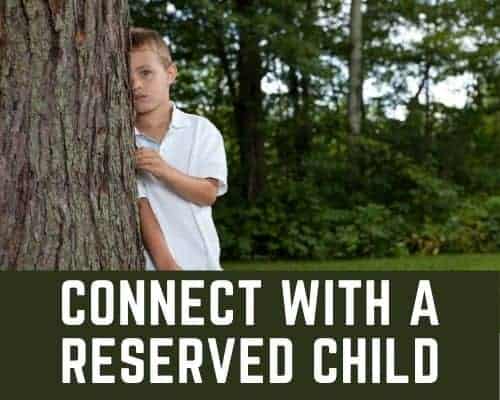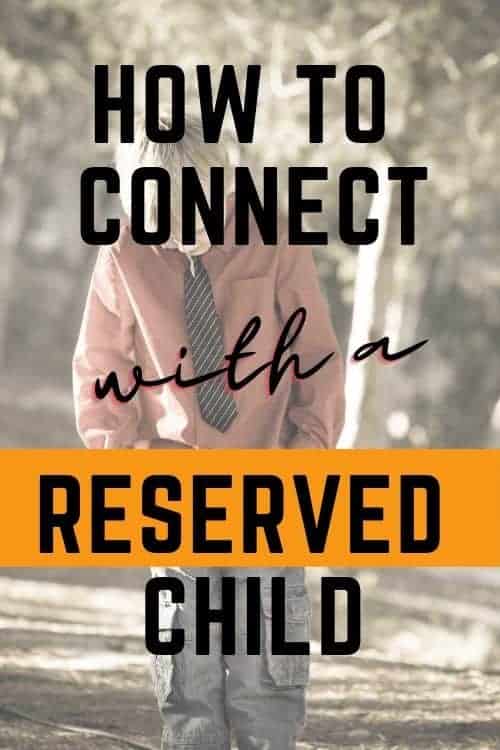
One of my sons is not much of a talker. It can be difficult to connect with him, since he is a more reserved child than the others. He tends to keep a lot of things quiet, often bottles up his feelings, and is typically a little more passive-aggressive.
It’s not that he never talks. He talks about things that interest him: often showing his newest creation, be it a fort, something crafted out of Lego blocks, or a wooden boat he built out of scraps.
But…feelings and emotions are either of no interest to him, or he just doesn’t know how to communicate them well. I think it’s a bit of both. Either way, sometimes, it’s a bit difficult to find ways to connect with my reserved child.
I would guess that this is not abnormal. My guess is that nearly every family has one child who shrinks into the background a little more while the other siblings fight for the chance to talk…but just because it’s normal, doesn’t make it a good thing.
So, how do you connect with that reserved child?
This is an ongoing battle for me because the other thing about these kids is that they, unlike their more talkative counterparts, don’t demand attention. They often shrink into the background and go do something quietly, while you listen to other children jabbering all day. They entertain themselves and before long, you haven’t seen your child in a while and wonder where he is!
It might be easy to just accept this and let it be, but that’s not what your child needs. I know this because of how my taciturn son handles his anger. Usually, if something is bothering him, we may not know it until he erupts. A person can only press down his feelings for so long before they come bubbling up.
We have encouraged him many times to talk to us about his feelings so that he doesn’t get to that point, and he does try sometimes, but usually doesn’t think about it until it’s too late.
That’s where we come in. As parents, it is our job to recognize our children’s needs often before they recognize their needs for themselves. This is one of those cases. You must connect with your reserved child before his feelings erupt.
But how can you connect with your child if he never really wants to talk to you?
Five Ways to Engage a Reserved Child:
- Be Intentional—
This is one of the most difficult steps for me because, like I said, it’s easy to forget that this child, who seems so independent and rarely gets ruffled about anything needs attention! And for me, I have three other children who are talking constantly to me throughout the day. I forget that I haven’t heard from my son in a while.
This is when I have to be intentional. I need to make sure I spend at least a few minutes each day talking with each of my children.
Sometimes, the latest Lego creation might be the topic of conversation, and that’s okay. But at least every couple of days, we need to connect with our reserved children and force them to talk about the things that are bothering them.
Many reserved children offer one-word answers. Yes. No. Nothing. Maybe you’ll get an “I don’t know” here or there.
Remember the art of the investigative question. If you are conducting an interview, you never ask yes or no questions. Instead of saying, “Is something bothering you?” You re-phrase it with, “What’s bothering you?” Instead of asking, “Did something happen today?” You ask, “Tell me about the most interesting part of your day.”
Rephrasing those questions will open the door to a more engaging conversation with your reserved child.
- Emphasize Good Feelings—
Sometimes, my son doesn’t want to talk about how he feels because then he has to…feel. If he is struggling with something, he thinks that if he doesn’t talk about it, it will go away. (I would guess this is more of a male thing than a female thing just based on how many women have told me their husbands are the same way, but I do know some women who struggle with this too.)
It’s important to help your child understand that feelings are not only bad. We can talk about good feelings too. For example, if your child is very excited to tell you all about the fort he is working on, listen! Then, follow up with a question like, “How does it make you feel when you’re building your fort?”
He might need some suggestions because he may not have the vocabulary to communicate his feelings. So you could ask if he feels proud of his accomplishment, or if he feels calm when he’s alone and working in the woods, etc.
Learning that there are more than three feelings (mad, sad, glad) is also important! Communicating your own feelings using more than those three words will help with this. If you are disappointed, use that word.
Sometimes, part of the problem is that our children only see those three emotions in us. These other feelings that we experience need to be taught to our children.
Helping your reserved child understand that feelings are an important and positive part of life will help him to better communicate in the future…hopefully!
- Take Interest in Her Interests—
Reserved kids are probably not going to just hop into a conversation about emotions or feelings, especially reserved boys. It’s important to have something else to talk about as a conversation starter. Make a mental note of what your child is interested in and ask about it.
Better yet, jump into an activity alongside your reserved child! Teenage boys who are pulling away from their moms, and reserved children may not sit and “talk” with you, but they may throw a football and let you in little by little. Or, they may sit next to you and paint with you and tell you all about the good, the bad, and the ugly while you participate in an activity they enjoy.
If your child only associates having a conversation with you with talking about feelings, she will be much less likely to want to discuss anything. Most of your conversations should be about her, her interests, and what excites her. Then, when you want to connect emotionally, she will be more comfortable discussing her feelings with you.
- Have One-on-One Conversations—
Often, reserved children will not be assertive enough to get a word in edgewise if they have talkative siblings. They are more likely to quietly observe a conversation than to participate. But listening is really an important skill, so this is not necessarily a bad thing!
We encourage participation by asking family questions that everyone takes a turn to answer. This way, the chattier kids realize that the entire conversation does not revolve around them; and the less talkative children get to participate, knowing that they will be heard.
It is also really important to have any major conversations about anger, emotions, and tough situations in a one-on-one, or two (parents)-on-one setting. The likelihood that a reserved child will want to duplicate a conversation in order to include a parent that wasn’t there, is very slim. So, if both parents want to be involved, have the conversation together with your child.
Pulling your child out of a group setting will help him or her to be more authentic and honest with you because often, he or she might be embarrassed to show emotion. We have found that keeping our reserved child up for even five or ten minutes after his siblings go to bed makes him far more likely to connect with us.
- Pay Close Attention to Passing Comments and Follow Up—
Our son has had a lot of loss in the last five years. First of all, our foster son moved, which ravaged our whole family in one way or another. Less than a month after that, his best friend moved away. He made a new best friend, only to have him move away a couple of years ago. He has been very close friends with my nephew growing up and last year, he moved away as well.
More recently, our little neighbor boy who is much younger than my son, but with whom my son has played with and entertained a lot, moved as well and due to the social distancing restrictions, my son didn’t get to say “goodbye” to him.
I mentioned it last night to him—that I hoped his friend would come back to visit (because his grandparents live on our block) and my son said, “Well, it doesn’t really matter to me. There’s no point in making friends anyway.”
He didn’t add anything to the comment until I followed up with him later, one-on-one. I inquired about the comment and he replied, “Well, every friend I make moves away, so what’s the point?”
It broke my heart. And he was holding back tears (obviously, embarrassed about showing emotion). We were able to process those feelings and talk about the friends he has here who need him. We talked about how friendship is sometimes more about what you can give to someone else than what you get in return. It was a short chat, but necessary.
Let your ears perk up to those comments made in passing and then follow up in a one-on-one setting. This way, your child can truly process what he or she was thinking when that comment was made.
Final Thoughts on Connecting with a Reserved Child
Sometimes, our easiest-going children are the most difficult to engage and build a relationship with. These kids need our time and attention, probably more than any of our other children because they won’t demand it!
We have to be more intentional with our reserved children. We must let them know that feelings are good; dealing with anger in the right way is healthy; and that time spent with them matters to us—it matters enough for us to make the effort!
What did I miss? How do you make sure you engage your reserved child?
RElated: Communicating with Children
